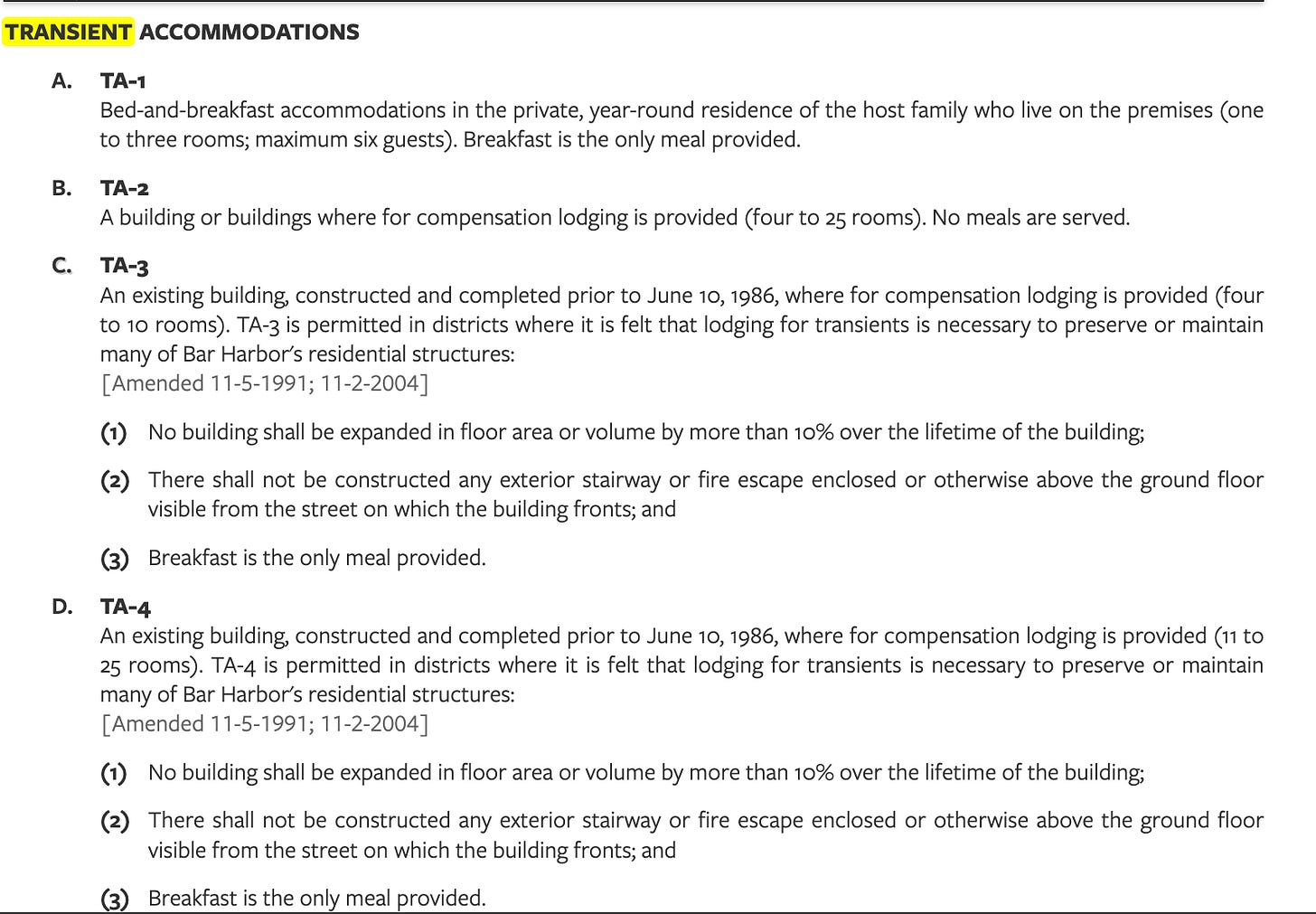When is a Bed and Breakfast a Bed and Breakfast?
Planning Board Discusses Lodging Definitions & Also Recommends Warrant Articles
BAR HARBOR—The Bar Harbor Planning Board Wednesday unanimously voted that four changes to the town’s land use ordinance ought to be adopted by voters. Those recommendations will be posted on the June 13 town meeting warrant.
“An amendment to remove the double setback distances.”
“An amendment to remove the Floor Area Ratio requirement.”
“An amendment to remove the Conversion to Multifamily Use Requirements.”
“An amendment to remove the requirement that all utilities be installed underground.”
Each of these amendments are explained in earlier articles. Links are below.
The board also unanimously adopted the revised rules of procedure for its meetings. The new order of agenda doesn’t match in the town code, so that might also have to be changed by the council. Other changes allow electronic submissions to the board.
The remainder of the meeting was about possible changes to the town’s land use ordinance about lodging uses and zoning districts where employee living quarters and shared accommodations are allowed. The town’s land use ordinance regulates the development and use of land within the town.
Code Enforcement Officer Angela Chamberlain asked for the board’s guidance prior to continuing further in her work about those aspects of the ordinance.
“I’m just starting to dive into this,” Chamberlain said.
There are 19 different types of lodging uses in the ordinance. Chamberlain said that there are inconsistent standards for many of those uses. The town’s planning department wants to streamline those types for consistency and clarity.
In June of 2010 there was a Land Use Ordinance amendment that removed all the transient uses and another added bed and breakfasts. The town was sued. Three of the four amendments were null and void, she said. Things that had been removed by the voters then went back into the ordinance (eight transient accommodations definitions, a hotel and motel issue). “Fast forward and we have 19 types of lodging,” Chamberlain said.
What she hopes for is consistent and appropriate standards and requirements and permitting processes for lodgings. Her questions to the board included:
Should lodging definitions include number of rooms?
Not all uses require parking even when they are similar uses?
Is the year the structure was/is built relevant?
Should there be an expansion restriction (less that 10% over the lifetime of structure)?
Should lodging definitions include number of rooms?
Member Earl Brechlin asked if the number of rooms allowed correlated to different zones. Chamberlain said that transient accommodations have room limitations, but bed and breakfasts don’t.
The disconnect isn’t just about bed and breakfasts and their potential size. Brechlin said that he knows of someone who couldn’t get a vacation rental under the town rules and applied for a transient accommodation instead, which only required a one-time $1,000 fee. He worried about the circumvention of vacation rental rules via the transient accommodation rules.
Chamberlain said that some other communities had room numbers in definitions and others didn’t. She specifically looked at Camden, South Portland, Freeport and Rockland. “They’re kind of all over the place.”
The board members seemed to have some consensus that other constraints more useful and consistent than number of rooms.
Should there be parking requirements for all lodging?
Brechlin said that there should be requirements and that for people’s faith and trust in the town’s process, projects of large scale should come before the Planning Board.
Inconsistencies discussed during this portion of the meeting included the ability to have a weekly rental where you can have 20 unrelated people in a building but the same building when considered a multifamily home, can’t have more than five unrelated people.
The board also quickly discussed what “owner-occupied” means for bed and breakfasts rather than hired-employee or manager occupied and delved into parking space needs being determined by rooms rather than maximum occupancy or square footage.
Employee Living Quarters and Shared Accommodations
At an earlier meeting, Glenon Friedmann had asked about the ability to put employee housing or shared accommodations on farms for employees. This is not currently an allowed use in the zone where her farm is. Therefore, there would have to be land use ordinance amendments to expand the number of zoning districts where employee living quarters and shared accommodations are allowed.
Planning Director Michele Gagnon said that these uses are allowed where lodging and retail are allowed. She thought the next step might be a review of what districts are residential and commercial and see if there are places to support those uses.
Comprehensive Plan Committee Update
The Comprehensive Plan Committee will hold four events about the draft vision and draft future land use map, Gagnon said. There will also be an early breakfast event targeted toward business. There will be small group breakouts at the events.
LINKS TO LEARN MORE
https://www.barharbormaine.gov/282/Planning-Board
https://www.barharbormaine.gov/AgendaCenter/ViewFile/Agenda/_04052023-3182
Earlier story about the four proposed changes
Another earlier story about the proposed changes








